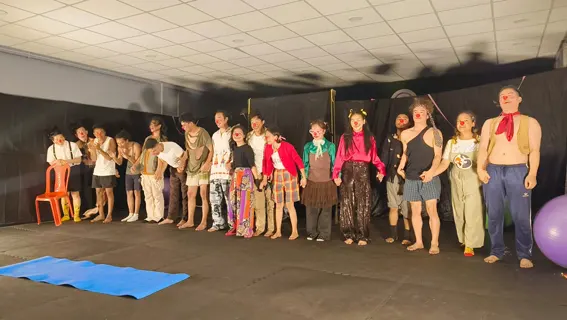[ Indu Chukhu ]
ITANAGAR, 5 Jun: Kamsa Dramatics Society organized a 10-day acting workshop on clowning from May 21st to 30th. This is the first time that the state has organized a workshop on clowning. At least 18 people participated in the workshop, with NSD alumnus Yash Yogi as the resource person.
Yogi said, “Clowning is required for the entire world and, most importantly, for actors, as it keeps them grounded.” He added, “I knew a few familiar faces in the workshop, but most of them were new to me. They came with all their rawness, which is essential for a clowning workshop. If you are well-versed and polished, that rawness won’t shine.”
The final day of the workshop featured a demonstration that entertained everyone present. It was themed “Kutu Kutu Aah Aah,” focusing on the fear of dog bites. There were mixed feelings throughout the activities, which unfolded in parts. The performance showcased different types of dogs, some as pets and some as strays. During the show, one stray dog gets infected and becomes rabid.
The play highlighted how society stigmatizes rabies infection, against the backdrop of over 117 rabies deaths within a week in the Itanagar capital region. The idea for the storyline was suggested by the actors, who also came up with the fictional names.
“It is a wonderful experience playing the role of a clown. The clown is your inner child, accepting you with all your rawness and genuineness. It not only teaches you to laugh but also to live your life wholeheartedly, with joy and laughter,” Yogi said. He remarked that clowning uses laughter to convey serious content, referring to characters in movies like PK and Laal Singh Chaddha.
Yogi, associated with films such as Dream Girl, Fukrey 3, and Mona Darling, says, “For an actor, clowning keeps them on their toes and serves a purpose in life.” Yogi, who visited the state earlier for a project with NSD professor Riken Ngomle, wishes to return to Arunachal Pradesh. He noted, “Clowning is a Western art form and is not widely explored in India. Despite the lack of specialized institutions for clowning, the country produces many practitioners who learn the craft through fellowships and workshops.”
Yogi also organizes clowning shows for cancer patients in Mumbai, special children, orphans, and in red-light areas, which he says is “an overwhelming experience.”
The special demonstration of “Kutu Kutu Aah Aah” revealed different layers of how dogs are treated, whether pets or strays. All 18 participants performed admirably. If authorities permit performances in public places like IG Park, the reach could be much wider, potentially changing perspectives on dog bites and rabies deaths.
Paalin Kabak, the director of Kamsa Dramatics Society, says, “Clowning is an art form that can be enjoyed by all age groups because it is so engaging and has immense scope here in Arunachal Pradesh.” He added, “Through the recent clowning workshop, the first batch has gained basic knowledge, but mastery depends on practice. One cannot fully learn clowning in a 10-day workshop; this art form takes time.”
“We look forward to organizing more clowning workshops in the state and conducting demonstrations on various issues and concepts. The age requirement for the clowning workshop is 18 years and above, and we strictly ensure that no one skips their classes during the workshop,” added Kabak.




